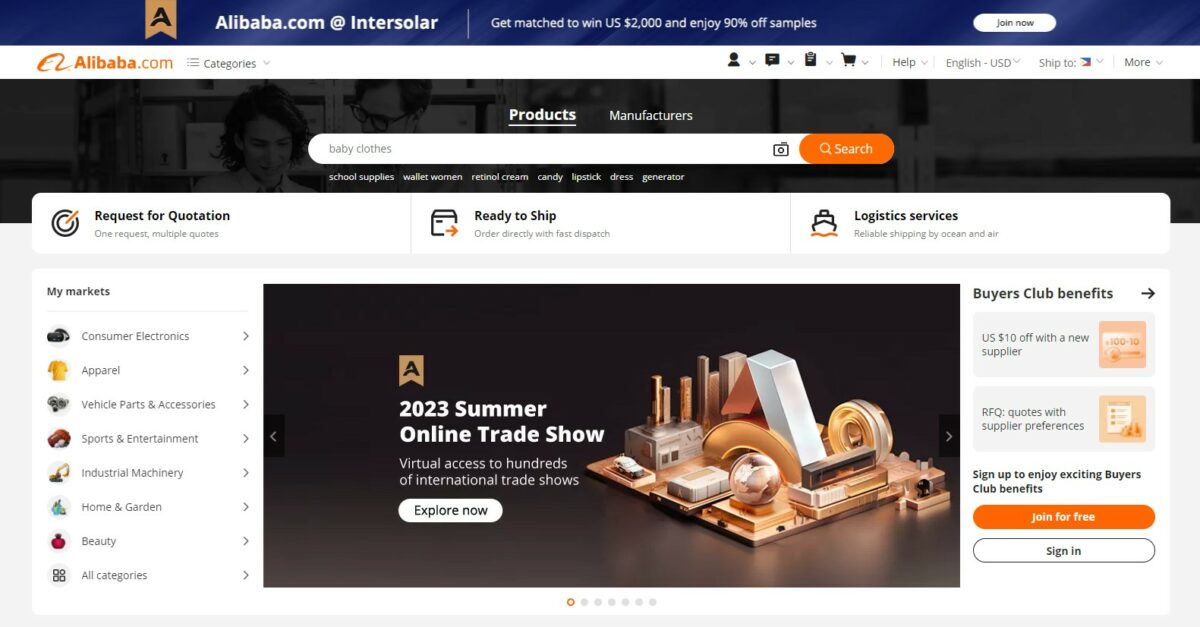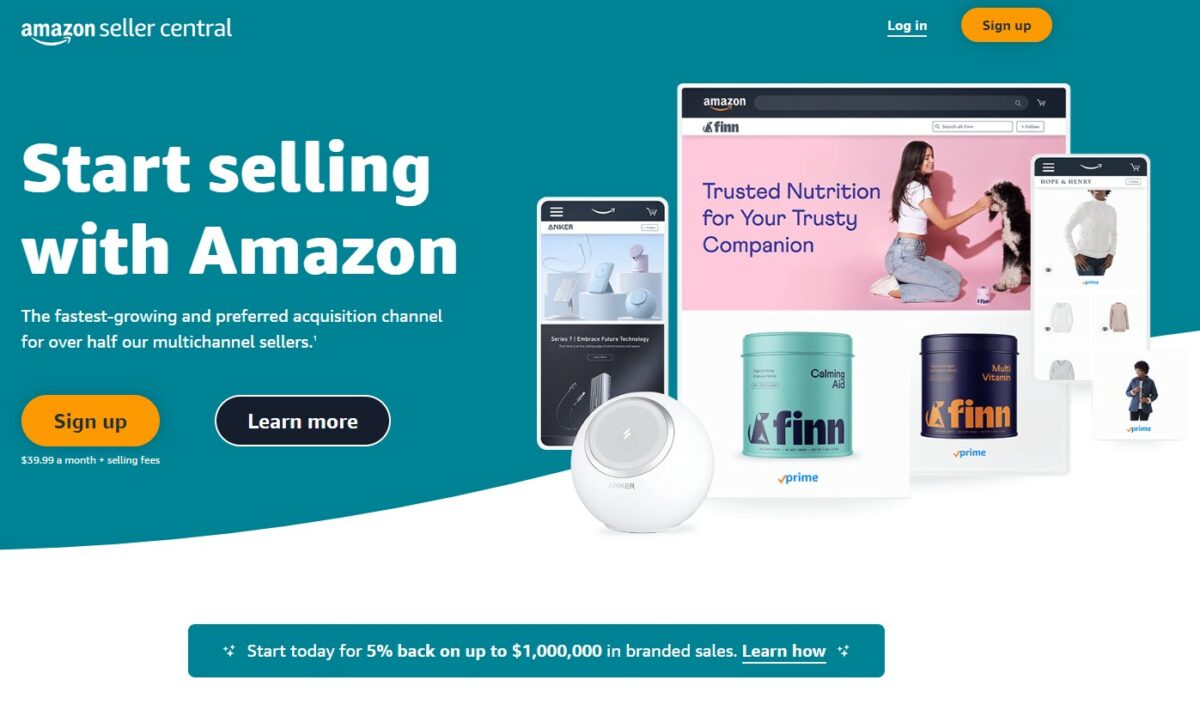Selling on Amazon can be a lucrative business, and Alibaba is one of the most popular platforms for sourcing products to sell on Amazon.
If you’re looking to start your own Amazon business, learning how to sell on Amazon from Alibaba is a great place to start.
The first step in selling Alibaba items on Amazon is to ensure that you are legally allowed to do so.
Once you’ve confirmed that you can sell Alibaba products on Amazon, you’ll need to find reliable suppliers on Alibaba.
It’s important to do your research and choose suppliers with good ratings and reviews to ensure that you receive high-quality products.
Additionally, you’ll need to consider shipping times, costs, and any potential customs fees.
Overall, selling on Amazon from Alibaba can be a profitable venture with the right strategy and approach.
In this article, we’ll provide you with top tips on how to sell on Amazon from Alibaba, including how to find reliable suppliers, manage shipping and customs, and optimize your listings for maximum sales.
Post Contents
Researching Products on Alibaba

When it comes to selling on Amazon from Alibaba, researching products is a crucial step.
Finding a Niche Product
The first step in researching products on Alibaba is to find a niche product.
A niche product is a product that targets a specific group of consumers.
It’s important to find a product that is not too saturated in the market and has a high demand.
Here are some tips to help you find a niche product:
- Look for products that are not available in your local market.
- Use Amazon’s Best Seller Rank to find products with high demand.
- Use Google Trends to find products that are trending.
- Look for products that solve a problem or fulfill a need.
Evaluating Potential Suppliers
Once you have found a niche product, the next step is to evaluate potential suppliers.
Evaluating potential suppliers is important to ensure that you are working with a reliable and trustworthy supplier.
Here are some tips to help you evaluate potential suppliers:
- Look for verified suppliers on Alibaba.
- Check the supplier’s ratings and reviews.
- Ask for samples to test the product’s quality.
- Negotiate the price and terms of the agreement.
- Check the supplier’s compliance with product safety standards.
By following these tips, you can find a niche product and a reliable supplier on Alibaba.
Remember to take your time and do thorough research before making any decisions.
How to Sell on Amazon from Alibaba

If you are looking to sell products on Amazon, Alibaba can be a great source for finding suppliers.
Here are the steps to sell on Amazon from Alibaba:
1. Creating an Amazon Seller Account
To start selling on Amazon, you need to create an Amazon Seller Account.
You can choose between a Professional Seller Account or an Individual Seller Account.
The Professional Seller Account has a monthly fee, but it allows you to list an unlimited number of products.
2. Understanding Amazon’s Fees
Before you start selling on Amazon, it is important to understand the fees involved.
Amazon charges a referral fee, which is a percentage of the sale price.
There are also other fees, such as a per-item fee, a storage fee, and a fulfillment fee if you use Amazon FBA.
3. Listing Your Products on Amazon
To list your products on Amazon, you need to create a product listing.
You can do this manually or by using a bulk upload tool.
You will need to provide information about your product, such as the title, description, and images.
4. Selling on Amazon FBA
Amazon FBA (Fulfillment by Amazon) is a program that allows you to store your products in Amazon’s warehouses.
When a customer places an order, Amazon will pick, pack, and ship the product for you.
This can save you time and effort, but there are fees involved.
5. Marketing Your Products on Amazon
To increase your sales on Amazon, you need to market your products effectively.
You can use Amazon Advertising to promote your products, or you can use social media and other channels to drive traffic to your Amazon listings.
It is also important to optimize your product listings for search by using keywords and providing high-quality images and descriptions.
Communicating with Suppliers

When sourcing products from Alibaba to sell on Amazon, communication with suppliers is key.
Negotiating with Suppliers
Negotiating with suppliers can be tricky, but with the right approach, you can get the best deals possible.
Here are some tips to keep in mind:
- Research: Before you start negotiating, do your research. Know the market price for the product you are interested in, and understand the supplier’s costs.
- Be Polite: Always be polite and respectful when negotiating with suppliers. Remember that they are people too and want to do business with someone they like.
- Set a Budget: Set a budget for your purchase and stick to it. This will help you avoid overspending and keep your margins healthy.
- Ask for Discounts: Don’t be afraid to ask for discounts. Many suppliers are willing to negotiate on price, especially if you are purchasing in bulk.
- Consider Other Factors: Price is not the only factor to consider when negotiating with suppliers. Consider lead times, shipping costs, and payment terms as well.
Communicating Effectively with Suppliers
Effective communication with suppliers is essential to ensure that your orders are fulfilled correctly and on time.
Here are some tips to help you communicate effectively with your suppliers:
- Use Clear and Concise Language: Use clear and concise language when communicating with your suppliers. Avoid using technical jargon or industry-specific terms that they may not understand.
- Provide Detailed Specifications: Provide your suppliers with detailed specifications for the products you want to purchase. This will help ensure that they understand your requirements and can deliver the products you need.
- Be Responsive: Respond to your suppliers promptly. If they have questions or concerns, address them as quickly as possible to avoid delays in production or shipping.
- Use a Professional Tone: Use a professional tone when communicating with your suppliers. Avoid using slang or informal language that may be misinterpreted.
- Build Relationships: Building relationships with your suppliers can help you secure better deals and ensure that your orders are fulfilled correctly. Take the time to get to know your suppliers and treat them with respect.
Shipping and Customs

When it comes to selling on Amazon from Alibaba, shipping and customs can be a bit tricky to navigate.
But don’t worry, we’ve got you covered.
Understanding Shipping Costs
Shipping costs can vary greatly depending on the size and weight of your products, as well as the shipping method you choose.
When you’re sourcing products from Alibaba, be sure to ask your supplier for a breakdown of the shipping costs, including any fees for customs clearance.
It’s also important to consider the shipping time when calculating your costs.
If you need your products to arrive quickly, you may need to pay more for expedited shipping.
On the other hand, if you have more time, you can save money by choosing a slower shipping method.
Navigating Customs
Customs can be a bit of a headache when it comes to importing products from Alibaba.
But with a little bit of preparation, you can minimize any potential issues.
First, make sure that your products meet all of the relevant customs regulations.
This may include things like labeling requirements or restrictions on certain materials.
Your supplier should be able to provide you with all of the necessary documentation and information.
It’s also important to be aware of any taxes or duties that may be imposed on your products.
These can vary depending on the country you’re importing to, so be sure to do your research ahead of time.
Shipping Products to Amazon
Once your products have cleared customs, it’s time to ship them to Amazon FBA.
This is where things can get a bit complicated, but Amazon has made the process as easy as possible.
When you create a shipment to Amazon FBA, you’ll be given a shipping label to attach to your products.
You’ll also need to provide information about the contents of your shipment, including the number of boxes and the weight of each box.
Once your shipment arrives at the Amazon FBA warehouse, Amazon will take care of the rest.
They’ll handle the storage and fulfillment of your products, so you can focus on growing your business.
Ensuring Product Quality and Safety

When sourcing products from Alibaba to sell on Amazon, it’s essential to ensure that your products meet quality and safety standards.
Product Samples and Quality Control
Before purchasing products in bulk, it’s crucial to order product samples to ensure their quality.
You can request samples from multiple suppliers to compare and choose the best one.
When ordering samples, make sure to check for the following:
- Quality: Check for defects, damages, and overall quality of the product.
- Packaging: Ensure that the product is packaged securely to prevent damage during shipping.
- Branding: Check if the product has any branding or logos that may infringe on trademarks or copyrights.
Once you have chosen a supplier, it’s essential to establish a quality control process.
This process should include regular inspections of the products to ensure that they meet your standards.
Avoiding Counterfeit Products
Counterfeit products are a significant concern when sourcing products from Alibaba.
To avoid counterfeit products, you should:
- Research the supplier: Check the supplier’s reputation and ratings on Alibaba and other platforms.
- Verify the product: Look for anti-counterfeiting policies and measures on the product, such as serial numbers, holograms, or other security features.
- Use a third-party inspection service: Hire a third-party inspection service to inspect the products before shipment.
By following these tips, you can ensure that the products you source from Alibaba meet quality and safety standards and avoid counterfeit products.
Maximizing Profit

When selling on Amazon from Alibaba, maximizing your profit is essential.
Here are two crucial sub-sections to consider when developing your profit maximizing strategy:
Calculating Profit Margin
Before you can develop a pricing strategy, you need to know your profit margin.
Your profit margin is the difference between the cost of goods sold (COGS) and the price at which you sell your product.
To calculate your profit margin, use the following formula:
Profit Margin = (Sale Price - COGS) / Sale Price x 100%
Your COGS includes the cost of the product, shipping fees, and any other expenses associated with getting the product to Amazon’s warehouse.
Keep in mind that Amazon also charges fees for selling on their platform, so be sure to factor those into your calculations.
Developing a Pricing Strategy
Once you know your profit margin, you can develop a pricing strategy that maximizes your profits.
Here are a few tips to keep in mind:
- Research your competition: Check out what your competitors are charging for similar products and adjust your prices accordingly.
- Consider Amazon’s fees: Amazon charges fees for selling on their platform, so be sure to factor those into your pricing strategy.
- Use dynamic pricing: Amazon’s algorithm takes into account the price of your product when determining where it appears in search results. Consider using dynamic pricing to adjust your prices based on demand and competition.
- Offer promotions: Offering promotions can help increase sales and boost your product’s visibility on Amazon.
By calculating your profit margin and developing a pricing strategy that takes into account Amazon’s fees and competition, you can maximize your profits when selling on Amazon from Alibaba.
Dealing with Competition and Reviews

When selling on Amazon from Alibaba, you will encounter competition from other sellers.
It’s important to understand how to analyze the competition and manage reviews to stay ahead.
Analyzing Competition
To analyze your competition, you can use tools like Jungle Scout, AMZScout, or Helium 10.
These tools can help you identify the top sellers in your niche, their sales volume, and their product pricing.
You can also use these tools to research customer reviews and identify common complaints or issues with products in your niche.
Once you have this information, you can adjust your pricing, product features, or marketing strategy to differentiate yourself from the competition.
For example, if you notice that your competitors are selling similar products at a lower price, you can consider offering a bundle deal or free shipping to attract customers.
Managing Reviews
Reviews are important for your Amazon seller account because they can affect your product’s ranking and sales.
It’s important to monitor your reviews regularly and respond to any negative feedback promptly and professionally.
To manage your reviews effectively, you can use tools like FeedbackWhiz or FeedbackFive to automate review requests and monitor your feedback.
You can also use Amazon’s Early Reviewer Program to encourage customers to leave reviews for new products.
When responding to negative reviews, it’s important to address the customer’s concerns and offer a solution or apology.
This can help to improve your product’s reputation and show potential customers that you are committed to providing quality products and customer service.
Legal Considerations

When selling on Amazon from Alibaba, it is important to consider the legal aspects to avoid any legal issues.
In this section, we will discuss some legal considerations that you should keep in mind.
Understanding Intellectual Property Rights
Intellectual property rights are crucial when selling on Amazon from Alibaba.
You need to ensure that the products you are selling do not infringe on any patents, copyrights, or trademarks.
Here are some tips to help you protect your intellectual property rights:
- Conduct a thorough research on the product and its manufacturer to ensure that it is not infringing on any intellectual property rights.
- Check if the product has any patents, copyrights, or trademarks.
- If you are creating your own brand, consider registering your trademark to protect it from infringement.
Complying with US Sales Tax Laws
When selling on Amazon from Alibaba, you need to comply with the US sales tax laws.
Failure to comply with these laws can lead to legal issues.
Here are some tips to help you comply with the US sales tax laws:
- Learn about the sales tax laws in your state and ensure that you are collecting the correct amount of sales tax.
- Register for a sales tax permit in your state.
- Keep accurate records of your sales and taxes.
Key Takeaways
When it comes to selling on Amazon from Alibaba, there are a few key takeaways to keep in mind to ensure your success.
Firstly, it’s important to do your research and choose the right product.
Look for products that have high potential for generating sales, and make sure to check the quality of the product before ordering in bulk.
Secondly, communication is key when working with suppliers on Alibaba.
Make sure to clearly communicate your requirements and expectations, and don’t be afraid to ask questions or negotiate prices.
Thirdly, consider using Amazon FBA (Fulfillment by Amazon) to streamline your selling process.
This service allows you to store your products in Amazon’s warehouses, and they handle the packing and shipping of your orders for you.
Lastly, always keep an eye on your profit margins and adjust your pricing accordingly.
Don’t be afraid to experiment with different pricing strategies to find what works best for your business.
By following these key takeaways, you can set yourself up for success when selling on Amazon from Alibaba.






























